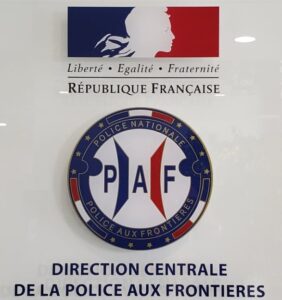The Police Cooperation component of the EL PAcCTO programme held a meeting with the French Border Police (PAF) in which there was a very fruitful exchange of information on the Police and Customs Cooperation Centres (CCPA) that will serve as the basis for the operational implementation of the Binational Police Cooperation Centres (CCPB) that the Programme is promoting in Latin America.
During the meeting, Commander Christine Denhez of the Central Directorate within the Border Police congratulated the Programme on the work carried out in creating the Paso Canoas Binational Police Cooperation Centre (CCPB) between Panama and Costa Rica. In addition, she shared some recommendations for strengthening the CCPBs.
What missions do the Customs Police Cooperation Centres (CCPAs) carry out?
A Police and Customs Cooperation Centre is a binational inter-ministerial structure, more rarely trinational or quadripartite, located on the land border between several states, it is in charge of promoting and facilitating the exchange of information (in support of actions by operational or police or customs services) and, more generally, police cooperation between several neighbouring countries. The CCPA is made up of security forces from various countries: police, gendarmes, customs officials.
The CCPAs have a triple mission. They focus on:
- Information, the collection, and exchange of information, especially through responses to French and foreign service requests.
- Advice and operational support in exercising rights regarding cross-border observations and prosecutions (they transmit urgent requests to the competent authorities) and assistance for readmissions with the associated state or states, on the basis of the readmission agreement signed with the neighbouring state.
- Coordination of cross-border operations (for example, control operations between the services in charge of combating irregular immigration, in the context of surveillance, search and intervention in border areas).
Thanks to bilateral agreements, it is possible for a French policeman, gendarme or customs agent to exchange information with their counterparts from another European UnionMember State (as well as Switzerland) bordering France through the police and customs cooperation centres.
This information sharing may include:
- Identification of vehicle owners and drivers.
- Driver’s licence applications.
- Searches for current addresses and residences.
- Identification of telephone line holders (when the partner country allows it).
- Establishing a person’s identity.
- Police information included in computerised files or other police documents.
- Police information regarding drugs cases.
- Information during cross-border observations (emergencies).
- Information in cross-border processes.
- Preparing plans, harmonising investigative measures and triggering urgent searches.
- Requests relating to sales channels, particularly for weapons and vehicles.
It should be noted that the CCPA does not carry out field actions.
What would be the next steps in strengthening the Binational Centre for Police Cooperation, which was created on the model of the European CCPD, in Paso Canoas (Panama)?
The Paso Canoas CCPB was created with the assistance of French and Spanish experts, based on a binational cooperation agreement between Panama and Costa Rica.
As a first step, work could be undertaken to make people aware of the CCPB and promote knowledge regarding the centre so that all the security personnel from Panama and Costa Rica know that they could benefit from the support of the CCPB in as far as their requests for cooperation with the other state are concerned. This could involve actions during the initial and ongoing training of police officers, customs officials, but also magistrates from the two partner countries, the dissemination of “reflection sheets” and information packages within the services.
At the same time, bilateral agreements would allow the necessary legal frameworks to be established relating to:
- Joint patrols.
- Hot pursuits.
- Joint surveillance measures in border areas, including the fight against border crime and the prevention of threats to public safety.
Commander Christine Denhez
Border Police Central Directorate

